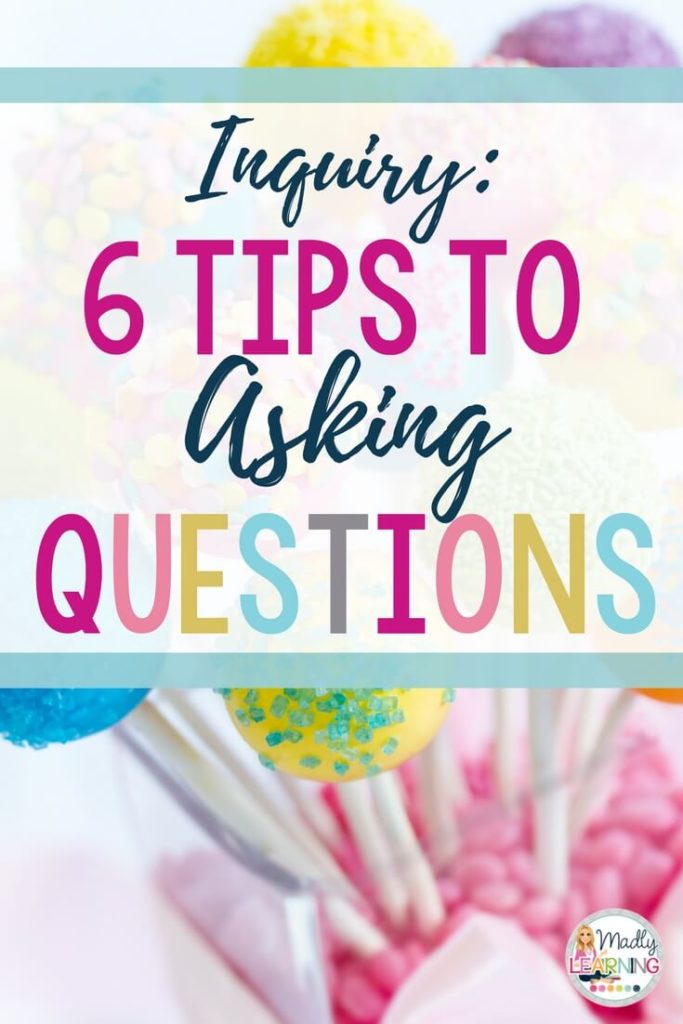
Being able to ask good questions is an important part of the inquiry process. However it is often difficult task for students to ask the type of questions that lead to authentic inquiry. When given a topic then asked to post questions students will often ask lower level thinking questions or questions that are unrelated to the theme they are studying. Asking question this is a theme that my colleagues and I are exploring in more detail at my school. Through this focused exploration, and my experiences with my students struggling through generating inquiry questions I have come up with a tips that I wanted to share with you.
All Questions are Important
Much of the focus on inquiry is on the higher order thinking questions from the Q chart. However what I have learned is that all of the questions that the student can ask are important. At the beginning of an inquiry project students may ask lower-level fact-finding questions these questions are important for students to ask and will form the basis of a student developing their understanding. Eventually they will be able to ask higher order thinking questions. What I found is it students have a difficult time asking higher order thinking questions when they don’t have the necessary background knowledge needed to investigate deeper into their topic.
Students may be able to ask the question but the may not be ready to find the answer.
Some students who were given the formula to create a higher order thinking questions were able to do this successfully. However what I have found is that just because they’re able to ask the question doesn’t mean they’re ready to find the answer. Being able to ask a good inquiry question does not mean the student is ready to find the answer to that same Big idea question. First the student must understand the facts. Getting them to ask WHO, WHAT, WHERE, and WHEN questions will help them to build the necessary background knowledge that they need to eventually be able to answer the inquiry question.
Conference by asking questions of their questions.
Some of the most viable conversations I had with my students were of me asking questions about their questions. Through this process we were able to refine and evaluate the types of questions that they were asking in order to encourage them to dig a little deeper into their topics. Sometimes I found that through my questioning students discovered that they already knew the answers to the questions they needed to ask but through this conferencing process they themselves were able to discover this. I believe this was much more valuable than if I had just given them the answer, or in this case the question.
Questioning should be more than just one lesson
In social studies and science having the students ask questions should happen all throughout the unit not just the one lesson right before they begin their inquiry projects. Students should ask questions before the unit begins (provocation) this will help assist teachers to understand what they already know and where the students want to go. Refining these questions throughout the teaching and learning process and asking new ones as we go along will help students to understand the topic of study in more depth.
Key Words
Asking students to ask a question is a very general and open ended task. I can’t count how many times I have given students and overall topic and asked them to generate questions and then have been disappointed with the types of questions that I get. Many of them are so off-topic, basic or lack variety that I struggle to move them towards higher order thinking questions with what they give me. This time, before we asked questions, we generated a list of keywords. I asked them “what have we been learning about?” The words they gave me made up the list of our keywords. From there I asked students to make questions to put on an anchor sized Q chart that used our keywords. I was surprised at the difference of the type of question students were able to ask when given these parameters.
Direct teaching still happens
Just because our focus is on student inquiry does not mean that direct teaching no longer happens in my classroom. It does and it is important. Skills such as summarizing need to be explicitly taught, developing an understanding of new vocabulary is necessary in order for students to understand the information that they will read. Directly teaching my students about economic sectors was an important task that needed to be completed before students were able to complete an inquiry project looking at the environmental impacts of a primary sectors in Canada. The economic sectors seem like such a complicated concept for grade 4 students to understand but in reality when it was taught to them directly they easily got the concept. They were the better prepared to choose an appropriate topic on the environment for inquiry that also met curriculum expectations.
As I learn through implementing inquiry based learning into my own classroom I will continue to refine my understanding of how this process works. Please join me on my continued journey at implementing inquiry into my classroom!
Do you have any great revelations about questioning in your classroom please share in the comments below






